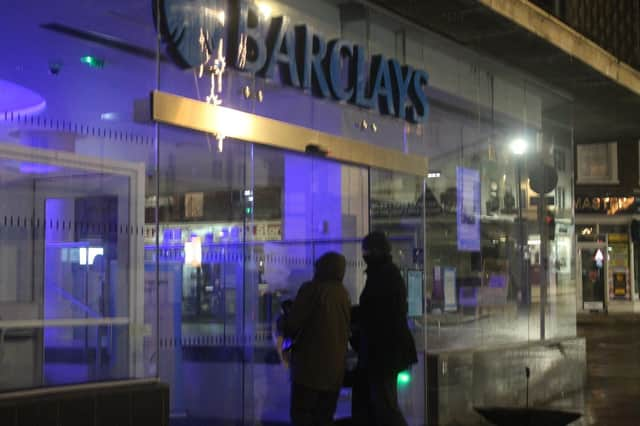Extinction Rebellion glue doors of Barclays branches across UK including Guildford, Horsham, Brighton and Farnham


At dead of night and armed only with tubes of superglue, activists held the number one funder of fossil fuels in Europe1 to account for its continued climate-wrecking criminal damage which endangers the future of all life on the planet.Since the Paris Agreement Barclays has supported fossil fuels with $190.58 billion of investments. New fossil fuels are incompatible with the Paris Agreement goal of keeping temperatures below 1.5C.3
Around fifty Barclays branches in city centres across the UK, including Kilmarnock Road in Glasgow, Albion Street in Leeds, the High Street in Lincoln and London’s Tottenham Court Road, were super glued shut overnight to protest Barclays’ continuing investment in oil and gas projects and to alert customers to the banks appalling impact on the climate and to urge them to switch to ethical banks using websites such as Switchit.green.6
Advertisement
Hide AdAdvertisement
Hide AdExtinction Rebellion has consistently held Barclays to account,4 as has Greenpeace which took similar action in 2020.5 Barclays has not taken heed so we demand that when Barclays updates its annual climate strategy for 2024 it commits to end the funding of fossil fuel projects and companies expanding fossil fuel extraction.
This is part of a significant new wave of property-focused climate action. Superglued locks shutting down a branch may impact its business in the short term, but the longer term damage is to Barclays’ reputation as customers discover how its outdated business model destroys the environment, and take their money elsewhere.
A Money Rebellion activist who took part in the action said: “Barclays are pumping billions into the fossil fuel industry, completely at odds with advice from the International Energy Agency, United Nations and IPCC. Barclays are choosing short term profits over a liveable future and a lot of us are sick of the measly progress they’re making, as they hide behind their lies and greenwash.”
An XR activist added: “We’re responding to public attitudes and targeting the perpetrators of climate breakdown, not ordinary people and we apologise for any inconvenience caused to staff and customers. The inconvenience we’ve caused this morning is small in comparison to the catastrophic events already happening due to Barclays’ financing of fossil fuels.”
Advertisement
Hide AdAdvertisement
Hide AdA Barclays spokesperson said: “Aligned to our ambition to be a net zero bank by 2050, we believe we can make the greatest difference by working with our clients as they transition to a low-carbon business model, reducing their carbon-intensive activity whilst scaling low-carbon technologies, infrastructure and capacity. We have set 2030 targets to reduce the emissions we finance in five high emitting sectors, including the Energy sector, where we have achieved a 32% reduction since 2020. In addition, to scale the needed technologies and infrastructure, we have provided £99bn of green finance since 2018, and have a target to facilitate $1trn in Sustainable and Transition financing between 2023 and 2030.”